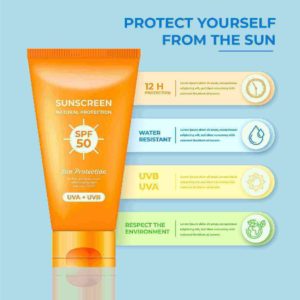A Complete Sunscreen Guide: Usage and Benefits for Skin

Are you guilty of thinking sunscreen is just for a day at the beach? Think again! Sunscreen is a daily essential that plays a crucial role in preserving your skin’s health and appearance. In this blog, we’ll dive into the world of sunscreen, exploring its importance, various types, and how to use it effectively. By the end of this blog, you will be ready to face the sun with confidence.
Why Sunscreen Matters: Skin Health and Beauty
Before we delve into the usage of sunscreen, it is important to know its benefits. The sun emits harmful ultraviolet (UV) radiation, which can wreak havoc on your skin. Here’s why it is your skin’s best friend:
1. Skin Cancer Prevention
UV radiation is a leading cause of skin cancer. By applying sunscreen regularly, you significantly reduce your risk of skin cancer, including the deadly melanoma.

2. Anti-Aging Superhero
It is the ultimate anti-aging product. It helps prevent premature aging, such as wrinkles, fine lines, and sunspots. If youthful skin is your goal, sunscreen is non-negotiable.
3. Prevents Sunburn
We’ve all experienced the discomfort of sunburn. Sunscreen acts as a protective shield, preventing the painful, red aftermath of excessive sun exposure.
4. Evens Skin Tone
Sunscreen helps maintain an even skin tone by preventing the development of hyperpigmentation and dark spots caused by sun damage.
Know Your Sunscreen Types
Understanding the difference is key to choosing the right one for your needs:
1. Chemical Sunscreens:
These contain organic compounds that absorb UV radiation and transform it into heat. They are lightweight, easy to apply, and come in a variety of formulations like lotions, gels, and sprays. Look for ingredients like avobenzone, octisalate, or octocrylene on the label.
2. Physical Sunscreens:
Also known as mineral sunscreens, they contain active ingredients like zinc oxide or titanium dioxide. These sit on the skin’s surface, creating a physical barrier that reflects UV rays. They are ideal for those with sensitive skin and provide broad-spectrum protection.
What is Sunscreen SPF?

Mineral Sunscreen + Moisturizer (SPF 50) PA+++ with Vitamin E and Natural Oils
SPF, or Sun Protection Factor, is a key element to consider when choosing a sunscreen. But what does the number actually mean?
SPF 15 : 93% protection against UVB rays,
SPF 30 : 97% protection,
SPF 50 : 98% protection.
For most people, SPF 30 is sufficient, offering a high level of protection. However, if you’re spending extended periods in the sun, opt for SPF 50 to be extra safe. Remember, no sunscreen is 100% effective, so reapplication is essential.
Sunscreen Application: How and When

Now that you know the basics, it’s time to learn how to apply sunscreen effectively:
1. The Right Amount: A general rule of thumb is to apply a shot glass worth of sunscreen to your body. For your face, a nickel-sized amount should suffice.
2. Reapplication: Sunscreen’s effectiveness diminishes over time. Reapply every two hours, or immediately after swimming, sweating, or using a towel.
3. All Year Round: UV rays are present year-round, so make sunscreen a daily habit, even in winter.
4. Don’t Forget Unexposed Areas: Often overlooked, your neck, ears, and the tops of your feet need protection too.
5. Layering with Skincare: Apply it as the final step in your skincare routine, before makeup.
Conclusion
Sun Shield isn’t just a skincare product; it’s your shield against harmful UV radiation, a defense against skin cancer, and the key to maintaining youthful, radiant skin.
By understanding the formulations, SPF, and proper application techniques, you can embark on your sun protection journey with confidence. Make it interactive and fun to inspire others to join you in the quest for healthier, happier skin. Embrace UV protection, and let your skin thank you for years to come.





